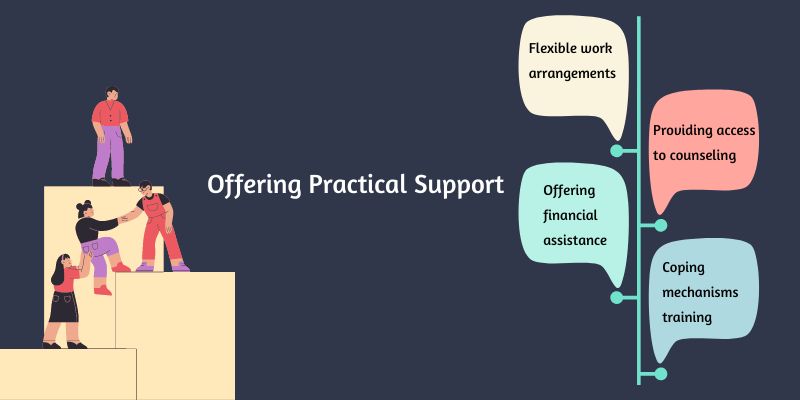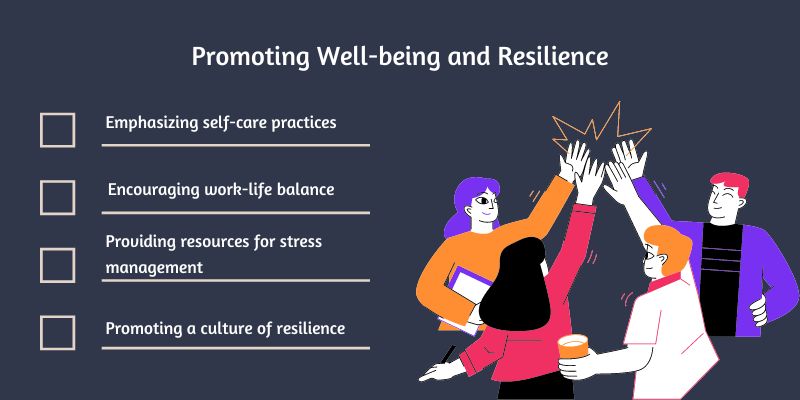A workplace crisis can be any unexpected event that disrupts normal operations and causes stress or harm to employees. Whether it's a natural disaster, financial downturn, workplace accident, or the sudden loss of a colleague, such events can leave employees feeling overwhelmed, anxious, and uncertain about the future.
Understanding how you can support staff after a crisis is incredibly important for their well-being and the organization's overall health. When employees don’t receive the right support, it can lead to lower morale, decreased productivity, and long-term emotional distress.
A survey revealed that 38% of employees would feel unsafe at their workplace following a crisis, and 25% would consider looking for new job opportunities.
So, how can employers help? From offering emotional support and counseling to providing practical resources and workplace adjustments, there are many ways to assist staff in coping and rebuilding their confidence.
We'll discuss ways employers can help employees cope with difficult times and rebuild their confidence and resilience, from offering emotional support and counseling services to providing practical assistance and resources.
Whether you're a manager looking for guidance on supporting your team or an employee seeking advice on coping with a crisis, this blog is for you!
Benefits of Supporting Employee After Crisis
When something bad happens—like a workplace accident, a personal loss, or a disaster—how a company responds can make a big difference in how employees recover. Giving real support is not just the right thing to do; it also helps the business in the long run. Here’s why it matters, along with some facts to back it up.
1. Supports Employee Well-being and Productivity
Going through a crisis can leave employees feeling stressed, tired, or even unmotivated. When they know their employer cares, they are more likely to stay focused and do their job well.
A meaningful increase in employee well-being yields, on average, an increase in productivity of about 12%.
Offer mental health support, allow flexible work hours, and remind employees about any available help, like counseling or support programs. Even small efforts can make a big difference.
2. Enhances Employee Engagement and Retention
If an employee goes through a crisis and feels ignored, they may start feeling disconnected—or even quit. Helping them shows that the company values them, which builds trust and loyalty.
A study indicated that psychological safety prevents the harmful effects of cognitive stress on employees' turnover intentions.
Keep communication open. Encourage managers to check in with employees after a crisis and make sure they know where to find help. Even a simple “How are you holding up?” can mean a lot.
3. Strengthens Organizational Resilience
A company that handles crises well is one that employees trust. When employees see their employer standing by them, they are more likely to stay motivated and do their best, even when things are tough.
Studies show that good communication during a crisis helps employees feel more confident in their company and improves work performance.
Have a clear plan for dealing with crises. Make sure employees know where to get help, and train managers to give the right support.
4. Supports Long-Term Employee Well-being
The way a company treats employees after a crisis affects their mental and emotional health for a long time. Workers who feel supported are less likely to struggle with ongoing stress or anxiety.
A study found that companies with strong support systems help employees stay healthier, especially after difficult events.
Make sure support doesn’t stop after the crisis. Offer long-term mental health resources, financial assistance if needed, and regular check-ins with affected employees.
How Can You Support Staff After a Crisis
Providing the right support after a crisis helps employees recover faster, feel valued, and stay engaged in their work. A thoughtful response can reduce stress, boost morale, and create a more supportive workplace culture. Here are some key ways to assist them during difficult times:
1. Offering Practical Support

Offering practical support to employees after a crisis is essential to helping them cope with the aftermath and face challenging times.
Practical support goes beyond emotional assistance and addresses the needs of employees, providing them with resources and solutions to manage stress and restore stability.
Flexible Work Arrangements
Flexible work arrangements, such as telecommuting, flexible hours, or compressed workweeks, can provide employees the flexibility they need to manage personal responsibilities and cope with the aftermath of a crisis.
Allowing employees to adjust their work schedules or locations to accommodate childcare, medical appointments, or other pressing needs is a key way to support employees after a crisis, helping to reduce stress and promote a healthier work-life balance.
Providing Access to Counseling or Therapy Services
Helping staff recover from workplace trauma requires providing access to counseling or therapy services, which are crucial for employees dealing with the emotional impact of a crisis.
Employers can offer Employee Assistance Programs (EAPs) or provide access to mental health professionals who can offer confidential counseling and support.
These services can help employees process their emotions, develop coping strategies, and seek guidance on managing stress and anxiety effectively.
Offering Financial Assistance or Resources
One of the best ways to assist staff post-crisis is by providing financial assistance or resources to help alleviate financial strain.
Employers can offer financial assistance programs, emergency loans, or access to community resources to help employees cover essential expenses such as housing, utilities, or medical bills.
Additionally, providing information on budgeting, debt management, and financial planning can empower employees to regain control of their finances and reduce financial stress.
Providing Training or Education on Coping Mechanisms
Training or education on coping mechanisms can equip employees with the skills and knowledge to manage stress and build resilience in adversity.
Employers can offer workshops, seminars, or online resources on stress management, mindfulness, and self-care techniques.
Employers can help employees thrive personally and professionally by providing practical tools and coping strategies.
By offering practical support in these critical areas, employers can demonstrate their commitment to their employees' well-being and help them recover from crisis impacts.
This creates a supportive and caring workplace culture and promotes employee resilience and retention in the long run.
2. Establishing a Supportive Environment

Creating a supportive environment after a crisis is crucial for helping employees feel safe, heard, and valued.
Employers can establish a supportive environment to foster trust, promote resilience, and facilitate healing for employees affected by the crisis.
Open Communication Channels
Open communication channels promote workplace transparency, trust, and collaboration.
Employers should encourage employees to share their thoughts, concerns, and experiences openly, without fear of judgment or reprisal.
This can be achieved through regular team meetings, one-on-one discussions, or anonymous feedback channels, allowing employees to voice their opinions and provide input on improving the workplace environment.
Providing a Safe Space for Expression
Providing a safe space for expression allows employees to express their emotions and concerns freely without fear of repercussions.
Employers can designate specific areas or times for employees to gather and discuss their feelings, experiences, and challenges related to the crisis.
Creating a supportive and non-judgmental environment where employees can share their thoughts and emotions can help alleviate stress and foster community and solidarity among team members.
Encouraging Peer Support and Teamwork
Encouraging peer support and teamwork can create a sense of belonging and camaraderie among employees, strengthening relationships and promoting resilience in the face of adversity.
Employers can facilitate peer support groups, team-building activities, or buddy systems where employees can lean on each other for support, share resources, and collaborate on solutions to common challenges.
By creating a teamwork and mutual support culture, employers can empower employees to overcome obstacles together and navigate difficult times more effectively.
Addressing Concerns and Fears Openly
Addressing concerns and fears openly is essential for building employee trust and reassurance.
Employers should proactively address employees' questions, uncertainties, or fears about the crisis and its impact on the workplace.
This can involve providing regular updates, sharing accurate information, and promptly addressing rumors or misinformation.
Employers can help control anxiety and uncertainty among employees and foster a sense of trust and stability in the workplace by demonstrating empathy, understanding, and a commitment to transparency.
By establishing a supportive environment through open communication, providing a safe space for expression, encouraging peer support and teamwork, and addressing concerns and fears openly, employers can create a workplace culture that promotes resilience, well-being, and unity in the aftermath of a crisis.
3. Promoting Well-being and Resilience

Promoting well-being and resilience among employees is essential in the aftermath of a crisis. It helps them cope with stress, build strength, and bounce back from adversity.
Employers can create a supportive and thriving workplace environment that fosters personal and professional growth by prioritizing employee well-being and resilience.
Emphasizing Self-Care Practices
Employee mental health support after a crisis includes emphasizing self-care practices that encourage employees to prioritize their physical, mental, and emotional well-being.
Employers can promote self-care by providing resources and education on healthy lifestyle habits, such as regular exercise, balanced nutrition, adequate sleep, and stress management techniques like mindfulness and relaxation exercises.
Encouraging employees to take breaks, practice self-reflection, and engage in activities they enjoy can help them recharge and maintain resilience in the face of challenges.
Encouraging Work-Life Balance
Encouraging work-life balance is essential for preventing burnout and promoting overall well-being among employees.
Employers can support work-life balance by offering flexible work arrangements, such as telecommuting or flexible hours, that allow employees to manage their professional responsibilities while attending to personal commitments and interests outside of work.
As part of effective crisis management for employees, setting clear expectations around workload and deadlines, promoting time management skills, and fostering a culture that values downtime and relaxation can help employees maintain a healthy balance between work and personal life during and after a crisis.
Providing Resources for Stress Management
Providing resources for stress management equips employees with the tools and techniques they need to cope with stress effectively.
Employers can offer workshops, webinars, or online resources on stress management topics such as mindfulness, deep breathing exercises, time management, and boundary-setting techniques.
If the employee is suffering from alcohol abuse or bullying at the workplace, the employer should focus on providing resources to manage these issues.
Canada Safety Training Centre offers some of the most comprehensive training programs, including Workplace Violence and Harassment Awareness and Substance Abuse Awareness Training, that can provide employees with the resources to deal with bullying and alcohol abuse.
Additionally, employers can provide access to counseling services, Employee Assistance Programs (EAPs), or mental health resources to support employees experiencing significant stress or emotional challenges.
Promoting a Culture of Resilience and Adaptation
Promoting a culture of resilience and adaptation encourages employees to embrace change, learn from setbacks, and grow more robust in the face of adversity.
Employers can encourage resilience by celebrating successes, acknowledging and learning from failures, and encouraging a growth mindset that views challenges as opportunities for learning and development.
Providing opportunities for professional growth and skill development, fostering collaboration and teamwork, and recognizing and rewarding resilience and adaptability can reinforce a culture that values resilience and supports employees in navigating difficult times.
Employers can promote well-being and resilience by emphasizing self-care practices, encouraging work-life balance, providing resources for stress management, and promoting a culture of resilience and adaptation.
This can create a workplace environment that supports employees' overall health, happiness, and success, even in the aftermath of a crisis.
4. Recognizing and Validating Staff Experiences
Recognizing and validating staff experiences involves acknowledging employees' unique emotions, challenges, and accomplishments after a crisis.
By acknowledging and validating their experiences, employers demonstrate empathy, understanding, and support, fostering a sense of validation and reassurance among employees.
Acknowledging Individual Experiences and Emotions
Acknowledging individual experiences and emotions means recognizing that employees may react differently to a crisis based on their circumstances, experiences, and coping mechanisms.
Employers should acknowledge and respect the diverse range of emotions that employees may be experiencing, including fear, anxiety, sadness, anger, or uncertainty.
By validating employees' emotions and experiences, employers create a safe and supportive environment where employees feel understood and valued.
Providing Validation and Empathy
Providing validation and empathy involves expressing genuine concern and empathy for employees' experiences and emotions.
Employers should listen actively to employees' concerns, validate their feelings, and offer support and reassurance without judgment or criticism.
Employers validate employees' experiences, assert their emotions, and show that their feelings are heard and respected by demonstrating empathy and understanding.
Avoiding Judgment or Criticism
Avoiding judgment or criticism is essential for creating a supportive and non-judgmental environment where employees feel safe to express themselves openly.
Employers should avoid making assumptions or passing judgment about employees' experiences, choices, or reactions to a crisis.
Instead, they should approach employees with empathy, compassion, and a willingness to understand their perspective, even if it differs from theirs.
Celebrating Resilience and Progress
Celebrating resilience and progress involves recognizing and applauding employees' efforts and accomplishments in overcoming challenges and moving forward after a crisis.
Employers should acknowledge employees' resilience, courage, and adaptability and celebrate their progress, whether small or incremental.
By highlighting employees' strengths and achievements, employers reinforce a culture of resilience, positivity, and growth, inspiring employees to strive for success despite obstacles.
Employers can create a supportive and affirming workplace environment that promotes healing, resilience, and well-being in the aftermath of a crisis.
This can be done by recognizing and validating staff experiences through acknowledging individual emotions, providing validation and empathy, avoiding judgment or criticism, and celebrating resilience and progress.
Final Words
Understanding how to support staff after a crisis is essential for creating a supportive and resilient workplace environment.
By acknowledging individual emotions, providing validation and empathy, and avoiding judgment, employers demonstrate their commitment to supporting their employees' well-being and recovery.
In the aftermath of a crisis, employees may experience a wide range of emotions and challenges, and employers must create a safe and non-judgmental space where employees feel heard, understood, and supported.
By validating employees' experiences and emotions, employers show that they care about their well-being and are committed to helping them navigate difficult times.
By highlighting employees' strengths and achievements, employers inspire confidence, motivation, and a sense of accomplishment among employees, reinforcing a culture of resilience and positivity in the workplace.
By prioritizing empathy, understanding, and celebration, employers can create a workplace environment where employees feel valued, supported, and empowered to thrive!